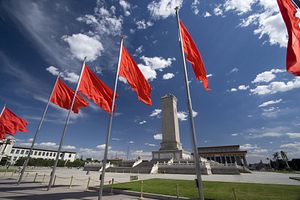The latest iterations of China’s Charity and Foreign NGO Management Laws, discussed during the recent National People’s Congress, present an interesting paradox. On the one hand, the laws, in total, will create a less free civil society and severely reduce the influence of foreign actors on the domestic affairs of China. On the other hand, if the laws are implemented as designed, they will provide a more accountable and predictable home-grown civil society.
Both laws follow the global wave of new regulations, from Russia to Ethiopia, governing social organizations’ behavior. In the Chinese version, the section of the recently-passed Charity Law (article 109) looking at “endangering national security or the public interest” is particularly alarming. This aspect of the law can be used by state authorities to justify investigating or closing the operations of social organizations who are perceived by the state to threaten the legitimacy of their activities.
This is an affront to those who see it as one of the main roles of the civil society sector to act as a check and balance to the state. While this function has been largely subdued in contemporary China – where the majority of social organizations currently operating in China are social and welfare oriented non-state providers, and not overt activists – the hope, notably among Western observers, has been a move toward this antagonistic model.
Reducing foreign actors influence on the domestic affairs of China is a main goal of both the Charity Law and the Foreign NGOs Law (which remains, for now, a draft). NGOs can, and have been, used by foreign states as a means to promote their objectives, values, and norms – even to the extent of toppling regimes. Chinese leaders are acutely aware of this potential, and thus, the Foreign NGO Law strictly stipulates that in order for a foreign NGO to legally operate it must establish a permanent representative office registered in China that has been approved by a government affiliated sponsor. The draft law further stipulates that foreign NGOs cannot conduct fundraising activities or accept donations in China. Moreover, foreign staff must not exceed 50 percent of the total number of an NGO staff and foreign staff cannot concurrently work for another NGO. Suffice to say, the new law stifles the proliferation of foreign NGOs in China and creates a more space for domestic NGOs to operate.
From another standpoint, if these strict rules governing foreign NGO activities come to fruition, foreign actors will have to become more creative to indirectly influence domestic activities. Perhaps the most promising strategy is to directly engage with policy entrepreneurs in China, e.g. think tank or government-organized NGOs (GONGOs), who are able to sway internal policy discussions.
Despite the charges of a less free civil society, the new Charity Law allows for greater accountability and predictability in domestic NGO activities. Foremost is the notion that social organizations can form a professional association (Article 24 of the Charity Law). This is a welcome turn of events that allows social organizations to come together in an institutional framework, forging networks that share best/worse practices and norms. This is a shorthand way of suggesting that there will be greater predictability in the activities of social organizations by virtue of hyper-professionalizing the industry.
Meanwhile, the fundraising aspect of the Charity Law requires a social organization to be separated into two classes: (1) fundraising through public channels; and (2) non-public fundraising, namely by accepting private gifts and donations. This dual class systems allows social organizations that previously had public fundraising status to keep their privileged status, while other organizations need to wait for a two-year period. This setup effectively maintains a two-tiered system, in which social organizations with public fundraising status (e.g. GONGOs or NGOs with strong government connections) are advantaged, while other organizations have to prove their credentials.
In terms of transparency, the Charity Law (notably in chapter seven) will require a level of reporting that smaller organizations (the majority of domestic NGOs) lacking staff, resources, and expertise will find it difficult to carry out. While this is a common situation in other jurisdictions, what makes the Chinese situation interesting, is that this – coupled with the fundraising aspect – will encourage larger domestic social organizations to survive, and crowd out smaller ones. This is not necessarily a terrible turn of events in the short term, as it incentivizes consolidation of already scarce resources to larger NGOs, who can use their economies of scale to execute their domestic mandate. Looking ahead, this may also be a boon for larger domestic Chinese NGOs who have aspirations for going abroad – which is slowly becoming a reality in Southeast Asia and Africa.
Taken together, China’s Charity and Foreign NGO Laws, while creating a less free civil society, allow the government, controlled by the Communist Party of China, to reduce foreign actors’ influence, and provide greater accountability and predictability to a home-grown civil society. Over time, this predictability will provide space for the state to further trust domestic civil society actors; and in the same breath, will give the Party a greater stranglehold over power in China.
Dr. Reza Hasmath is a Professor in Political Science at the University of Alberta.

































